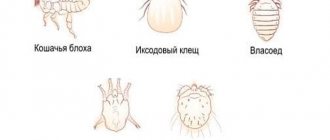Infection of pets with worms is not uncommon. Helminths are everywhere, and small kittens are especially susceptible to infection, since metabolic processes in their bodies occur faster, so the harm from parasites is much greater than for adults. Helminths or worms are parasitic organisms that inhabit mainly the intestinal tract. Parasites can live in liver structures, bloodstream or muscle fibers.
It is mistakenly believed among cat owners that only homeless animals or those who frequently visit the street are susceptible to infection, while domestic animals that do not have access to the street are not affected by helminthiases. Absolutely all dogs and cats are susceptible to infection with helminths, so the main task of the owner is to take the pet to a veterinarian in a timely manner, as well as to carry out preventive measures to prevent re-infection.
Causes of worms in kittens
Important: absolutely all pets (even those that have never been outside) can encounter the problem of helminthiasis. This is due to the high vitality of parasites and their ability to move on all kinds of carriers. You can become infected with this disease in different ways:
- in utero from an infected mother;
- when eating fish or meat that has not undergone heat treatment;
- when drinking untreated tap water or well water;
- while communicating and playing with sick animals;
- through contact with the owner’s street clothes or shoes;
- through insects (fleas, lice, lice).
Worms will not appear in kittens that have strong immunity. As for weakened animals (pets under six months old, elderly animals, chronic cats), they have a risk of contracting the disease even through indirect contact with an infected object, not to mention living carriers of endoparasites.
Prevention of helminthiasis
Try to do everything you can to prevent your pet from becoming infected. A number of preventive recommendations developed by veterinarians will help you with this. These include a ban on feeding raw fish and meat. The food must first be frozen, but it is best to boil it.
Prevention:
- Regularly change the bedding on which the pet lies, since parasite eggs can also remain on it;
- Keep the cat's litter box clean and change the litter frequently. It is recommended to disinfect the toilet 1-2 times a week;
- Preventive deworming should be carried out every 3-4 months, especially for cats that go outside;
- It is recommended to leave outdoor shoes and clothing in places that are inaccessible to the cat, since they can carry helminth eggs.
Helminthiasis is an unpleasant problem, but with the right approach it can be quickly resolved. The main thing is to promptly recognize the disease and treat the cat using various medications (tablets, drops, suspensions, etc.). After completing treatment, do not forget about prevention. Get dewormed and checked by a veterinarian regularly!
How to understand that a kitten has worms. Symptoms of helminth infection
Signs of the presence of worms in kittens are determined by their type and location. Common manifestations of infection include:
- partial or complete loss of appetite;
- digestive disorders with signs of diarrhea and vomiting;
- changes in behavior (apathy, lethargy, nervousness);
- deterioration in appearance.
Remember: similar symptoms can occur with other diseases. Giving your pet deworming medication for kittens without laboratory confirmation of helminthiasis may worsen its condition.
In some cases, other signs of a pet being infected with helminths may appear. When they are localized in the gastrointestinal tract - thirst, abdominal pain, pallor of the mucous membranes. When worms settle in the liver and pancreas of a kitten, it faces health problems such as yellowness of the sclera, skin, and pain in the right hypochondrium. When helminths are localized in the animal’s heart, it develops shortness of breath, rapid heartbeat, wheezing, and coughing leading to vomiting. When endoparasites form their colonies in the lungs of kittens, the latter experience symptoms such as hemoptysis, wheezing in the chest, and increased body temperature.
Symptoms of a kitten with worms
Symptoms of infection of the cat's body with endoparasites directly depend on the location of the helminths. Worms that affect parts of the intestinal tract manifest themselves with a more standard clinical picture, while helminths located in the liver do not show their activity for a long time.
Common signs of the development of helminthiasis in a kitten are:
- a sharp decrease in appetite or refusal to eat;
- weight loss due to lack of appetite;
- developmental problems;
- change in the characteristics of the coat (the coat is dull and actively falling out);
- attacks of nausea and eruption of gastric contents;
- bowel disorders in the form of constipation or diarrhea;
- bloating and increased gas formation;
- accumulation of purulent exudate in the eye area;
- change in behavior - lethargy and apathy;
- the presence of blood in vomit or feces.
The appearance of one of the above-mentioned signs of the presence of helminths in the body of a small kitten is a reason to immediately contact a veterinary clinic for help and treatment.
Qualified assistance is required, because independent prescription and use of antiparasitic drugs is fraught with the development of dangerous complications.
You can speed up the treatment process by providing stool tests during your visit to the veterinarian. In advanced cases of helminthiasis, vomit is taken for analysis, in which eggs or particles of worms can also be detected. For diagnostic purposes, a general blood test is also performed.
What worms can be found in a kitten?
Roundworms (nematodes). They are represented by roundworms, toxocaras, heartworms and hookworms. Depending on the type, they enter the body of a pet along with untreated meat, water, or through the bite of an infected insect. They are localized primarily in the gastrointestinal tract, but can affect the heart, lungs and other organs. They cause diseases that are difficult to treat and provoke the development of anemia in the pet, which is extremely dangerous for a fragile organism.
Tapeworms (cestodes). Represented by cucumber tapeworm, broad tapeworm, echinococcus and alveococcus. Depending on the species, they enter the pet’s body with raw fish, while swimming in the river or biting fleas that carry the parasite. They live exclusively in the intestines. They make themselves known by the manifestation of such signs of the presence of worms in a kitten, such as ulcers, tissue necrosis, perverted appetite, itching in the anal area.
Flatworms (flukes). Represented by cat fluke and pulmonary flukes. The animal is infected by eating raw fish and seafood. They parasitize the liver, gall bladder of a pet or its ducts. Feeding on animal tissues, damaging and destroying them, they lead to the formation of pulmonary paragonimiasis and alariasis. As a result of their impact on the body, serious pathologies of the respiratory system develop, which culminate in the death of the animal from pneumonia and sepsis.
What helminths can a cat be infected with?
Cats can be parasitized by nematodes, cestodes, trematodes and some other types of parasitic worms.
Tapeworms
. These are parasites that can reach very large lengths and are characterized by an endless growth cycle. The body of a tapeworm consists of separate segments that “mature”, separate and come out with feces, and new ones grow in their place. Tapeworms can live for a very long time, several years.
Roundworms
. The most common helminths found in cats are the Ascaris family - worms reaching from 2 to 7 cm in length. These parasites usually accumulate in the small intestine, which can lead to severe nutritional deficiencies in the animal and even cause acute intestinal obstruction.
In severe cases, a cat may have different types of worms at the same time, which complicates diagnosis and makes treatment more difficult.
Why is helminthic infestation dangerous?
Worms in kittens injure the mucous membrane of the digestive tract. Penetrating into the internal organs, they violate the structural integrity of the tissues and cells of the animal, limiting their functional activity. Emitting toxins during vital activity and decomposition, helminths lead to severe intoxication of the pet’s body. Weakened by the fight against endoparasites, the latter becomes vulnerable to various infections and viruses. In advanced cases (if vital arteries are damaged, the intestines are blocked or ruptured), the worst thing happens - the kitten dies.
Is there a danger to humans? Probability of infection
About 32 varieties of worms can live in a cat’s body, which pose a danger to human health. The main cause of infection is non-compliance with hygiene rules. When feeding a cat by hand or playing with it, parasite eggs land on the skin of the hands and then penetrate into the oral cavity.
In addition, worms can enter the human body by touching surfaces on which eggs remain (for example, a tray).
The danger of infection with worms for humans (without proper treatment):
- enterobiasis,
- Iron-deficiency anemia,
- dyspeptic disorders (heartburn, diarrhea, etc.),
- damage to internal organs, etc.
To avoid dangerous consequences, it is necessary to regularly examine your pet, and if the first signs of helminthiasis occur, seek veterinary help. The specialist will conduct a thorough diagnosis of the cat’s condition and tell you whether they are dangerous to the human body.
Diagnosis of parasitic disease
It is easy to guess that a kitten has helminthiasis when the worms (or their larvae or eggs) come out along with its feces. In other cases, the manifestations of this disease can easily be confused with symptoms of a cold, indigestion, or diseases of the internal organs. What should I do? To make an accurate diagnosis, contact a veterinary clinic. There, the pet will be given a referral for OAC, a coprogram, and, if necessary, an ultrasound of the heart or liver and an X-ray examination of the lungs will be performed. Based on the results of tests for worms, the kitten will be prescribed treatment. Which one will depend on the type of disease detected.
Danger of worms
The body of an infected animal is destroyed by worms in two directions.
Firstly, worms cause mechanical damage to the organs in which they are localized (and this can be not only the gastrointestinal tract, but also blood vessels, lungs and even the heart): trying to gain a foothold on internal organs or migrating, the parasites scratch them with their chitinous shells and jaws at attachment points.
Secondly, worms poison the animal. During their life, they release substances that cause intoxication in the cat’s body. As a result, cats' immunity decreases and their metabolism is disrupted. In advanced cases, the infected organs decay, and diseases of the nervous system occur, including paralysis of the hind limbs.
Since worms parasitize the cat’s body, a considerable part of the nutrients from the food is not absorbed by the animal, but goes to the worms. All this leads to a weakening of the body as a whole, cats begin to get sick more often and recover more slowly. Infected animals are more susceptible to infections not only because of weakened immunity, but also because of internal organs injured by worms.
Dead parasites in the process of their decomposition also poison the cat’s body.
At what age can a kitten be wormed?
The first deworming of a pet can be carried out at 3 – 6 weeks. The animal is dewormed again after 10 days. In the future, it is recommended to carry out antiparasitic treatment of the kitten at intervals of every 3–4 months. To select a drug for worms and calculate the correct dosage, it is recommended to consult a veterinarian. The specialist will examine the animal and give recommendations regarding the treatment of helminthiasis/prevention of its development.
Treatment for worms in kittens is mandatory before vaccination. The purpose of its implementation is to eliminate the negative impact of parasites on the animal’s body, reducing the risk of complications after immunization of the pet. This treatment is carried out 10 - 14 days before vaccination. It is believed that this time is enough for the kitten’s body to restore its immune status after suffering from parasitosis.
Despite the large selection of medicines, deworming is not carried out for everyone and not always. So, in particular, it is tolerated if the animal is weakened or in the acute stage of an infectious or chronic disease. A contraindication for treating a pet for worms is serious disturbances in the functioning of its liver and kidneys. The reason for medical withdrawal is individual intolerance to the components that are part of the anthelmintic drug.
General symptoms of parasites in a cat
Signs can be general, which are characteristic of almost all types of parasites, and specific. If we talk about general symptoms, then this is weakness, disruption of the intestines (constipation or diarrhea), the stomach swells, becomes tight, like a drum.
Almost always, the presence of parasites is “reflected” on the coat, it becomes dull, lifeless, and falls out. And often the eyes begin to fester.
The smell from the mouth is extremely unpleasant, and itching of the anal sphincter often occurs. Appetite disappears, although some parasites suck the cat's strength and energy so much that he has to eat a lot. However, despite the large volumes of food eaten, the animal is exhausted.
Agree that infection or worms in cats, whose general symptoms are mostly similar, are very easy to confuse. In addition, helminths reduce immunity, so any infection “clings” to the cat.
And then the signs of infectious and parasitic diseases are mixed, which complicates the diagnosis.
That is why it is important to carry out preventive deworming on time, as well as closely monitor the health of your cat.
What anti-worm medications for kittens should I choose?
Important: it is recommended to purchase and give your pet those medications that are appropriate for its age. The dosage should be selected depending on the degree of helminth infestation and their type. The drug should be given according to the instructions at the strictly designated time. Find out more from a specialist.
Suspensions
The medicine in this form is usually sold in syringes (without a needle), less often in bottles. Pre-shaken, it is poured into the animal’s cheek or mixed with a small amount of food. You do not need to select your own dosage.
Advantages: Worms in kittens are eliminated after a single use. It is convenient to give such an anthelmintic drug to an animal. The risk that the medicine will not give the desired effect is reduced to a minimum.
Disadvantages: Since the mucous membrane of kittens is sensitive, they may increase salivation and vomit. There is no need to be afraid of these manifestations. They disappear 15 minutes after oral administration of the drug.
Pills
Oral anthelmintics are given to the animal during the morning feeding. Method of administration: in powder form - along with food, in the form of a suspension (the powder is mixed with milk or water and poured into the kitten's mouth), in solid form under the tongue. The dosage is calculated according to the weight of the pet.
Advantages: Anti-worming tablets for kittens have a complex effect on the animal’s body. They have virtually no side effects. Some of these medications can be used to treat pets from 1 month of age.
Disadvantages: Some pets cough up the tablets within minutes of taking them. After compulsory treatment, they tend to be in a state of stress for a long time. During this period of time, the kittens do not leave their shelter and show serious resistance to any attempts to establish contact.
Drops on the withers
Medicines for external use. They are applied to the pet at the withers. Easily entering the bloodstream through the skin, such products begin to act throughout the body, not being inferior in effectiveness to suspensions and tablets.
Advantages: Anti-worm drops for kittens have a wide spectrum of action. They destroy not only internal, but also external parasites. Using such a medicine is simple - just apply it to the animal’s skin in places where it cannot lick it off.
Disadvantages: This type of drug has a weak effect. Most often it is used to prevent helminthiasis. After treatment, it is not recommended to wet the area where the anthelmintic was applied for 2 days.
Treatment
Therapy for helminthic infestations in cats is carried out comprehensively, taking into account the possible harm that parasites cause to the health of the animal.
First of all, after confirming the diagnosis, the doctor prescribes a drug for deworming. These can be in the form of tablets, suspensions or drops on the withers. Among the latter, Dironet® Spot-On can be recommended. This is a complex-action drug that can help cope with both mature forms of roundworms and tapeworms, as well as their intermediate forms of development. In addition, these drops are designed to eliminate cutaneous and subcutaneous parasites - fleas and ticks. The method of using the drug makes it possible to treat even the most capricious pets who refuse to take tablets or suspensions.
In addition to anthelmintic drugs, the doctor may recommend other medications - vitamins, enterosorbents, laxatives, etc. They are intended to more quickly eliminate intoxication and remove dead helminths from the intestines, as well as to restore the cat’s health.
How does a cat become infected with worms?
No matter how creepy it may sound, helminths and their larvae are everywhere: on the ground, on the grass, in any park or garden, in any soil and even in water, not to mention raw meat, fish and unwashed vegetables. In addition, many pest animals such as rodents are either themselves infected with worms or are carriers of parasites.
If your cat regularly goes outside, then he almost certainly has worms. But even if you have a domestic cat, she can pick up the infection very easily: we all constantly bring worm eggs into the house on our shoes (and sometimes on our hands!), so for a cat to become infected, it is often enough to walk on the dirty floor in the hallway or sniff the owner's shoes, and then lick your paws or nose.
Another source of danger is insects. Cats often hunt flies that fly into the room, and when they catch their prey, they eat it with pleasure. But flies and mosquitoes are intermediate links in the transfer of helminth eggs.
Often, infection with worms occurs due to eating raw meat or fish, especially river fish. However, pre-freezing and washing meat is not a panacea.
In kittens, infection with worms can occur from the mother or through consumption of mother's milk, or even at the stage of intrauterine development. In addition, cats become infected from each other through contact with infected animals. So if you have several cats, and one of them has worms, you need to treat all of them at the same time.
Consequences and possible complications
By parasitizing the animal’s body, helminths cause significant harm to it, which can lead to dire consequences or complications:
old cat
- Mechanical damage. Worms attach to the intestinal walls and tissues of other organs, thereby compromising their integrity. In particular, by damaging the mucous membrane of the gastrointestinal tract, parasites cause minor necrosis and bleeding. A large accumulation of worms clogs the intestinal lumen, which can lead to its rupture and, consequently, the death of the pet.
- Metabolic disease.
- Toxic effects , causing poisoning of the body and allergic reactions. As a result of the vital activity of helminths, substances that are toxic to the host’s body are released. In addition, dead worms decompose. All this leads to significant poisoning of the animal.
- Trophic impact. Worms take some of the host’s vitamins, beneficial microelements and hormones, absorb blood, enzymes and digestive juice. As a result, your cat is constantly lacking essential nutrients.
- Decreased immunity. Through tissues damaged by worms, pathogenic microorganisms enter the blood of an infected cat, provoking inflammatory processes. As a result, various complications arise, since the body, weakened by parasites, is not able to fully resist infectious diseases.











